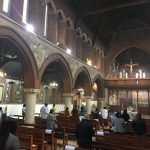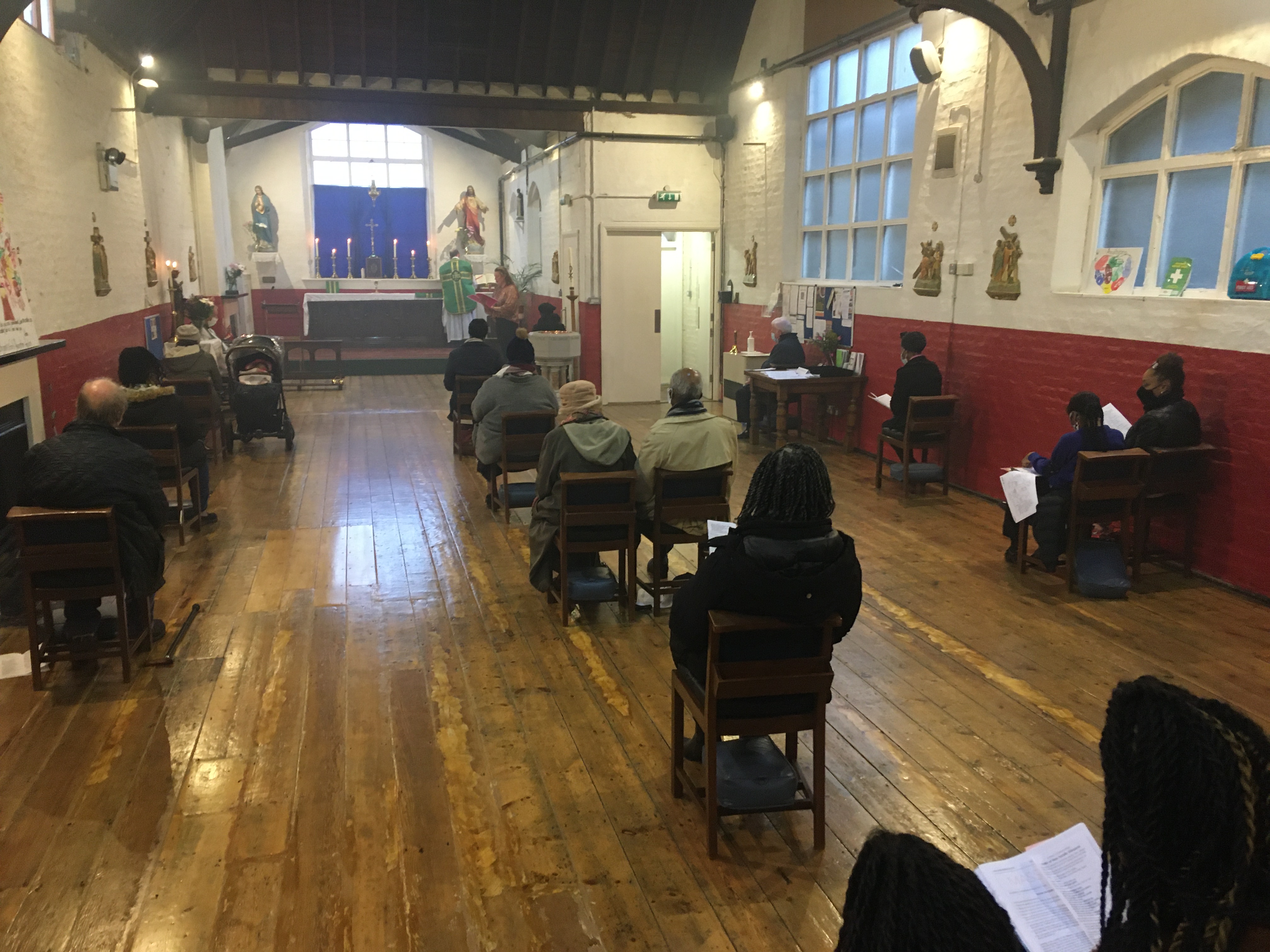Ordination of Priests, 24th June 2018, St Mary’s, Tottenham. Bishop Jonathan Baker.
Words from our first reading, the 49thchapter of the prophecy of Isaiah: “The Lord called me before I was born.”
Today is the Solemnity of the Nativity, or Birthday, of St John the Baptist, for centuries a day of feasting across eastern and western Europe, with celebrations often marked by fire. Breton fishermen would, on this day, attach baskets of old clothes to the masts of their fishing boats and set fire to them – the clothes, that is, not the boats – and still on this date there is a vast annual firework display on the banks of the Arno in Florence, that peerless city whose patron is John the Baptist. But aside from all this midsummer merrymaking, I want to suggest to our ordinands, and to all of you, that this day is a very fitting one on which to receive the gift, and the privilege, of ordination to the sacred priesthood. For St John the Baptist was born to be a priest, a priest of the household and lineage of Aaron, like his father Zechariah, whose speech is restored, in the Gospel reading we have just heard, when he confirms his wife St Elizabeth’s insistence that their son shall be called John, a name which means, ‘the grace of God.’
Zechariah is the first person to whom we are introduced in St Luke’s Gospel, and his account of Zechariah, Elizabeth and the birth of John is fundamental to St Luke’s conception of the story of our salvation, to his sense of the architecture of the saving purposes of God. Crucially, by placing of Zechariah and his priestly ministry in the Temple in Jerusalem at the beginning of his Gospel, St Luke teaches us that there are not two religions, that of Judaism and that of Christianity, but one revelation of God in two testaments or two covenants, which we now call the Old and the New. The Old Covenant always points forward to, and is fulfilled by, the New: that is why we can only make sense of reading the Old Testament in our Bibles by understanding it as speaking about Christ. So, in our passage from Isaiah this evening, we can understand verse 2 – ‘He made my mouth a sharp sword’ – as speaking of the Christ who St Matthew calls the one who comes not to ‘bring peace, but a sword,’ while some of the early Fathers of the Church understood the ‘sharpened arrow’ of Isaiah’s prophecy to stand for the divinity of Our Lord, hidden in the ‘quiver’ which is his humanity.
Zechariah was a priest of the Old Covenant, a descendent of Aaron of the division of Abijah; one of perhaps 18,000 priests in the Palestine of Our Lord’s time. For most of the time, those priests would have lived in the towns and villages beyond Jerusalem with their families; but for two weeks in each year, by rotation, each would come to the great city of David to carry out their priestly duties, and to play their part in the cultic life of the Temple, the epicentre of the worship of the God of Israel on earth. By lot, one such priest would be chosen to enter the Holy Place, that second but last chamber of the Temple which led to the Holy of Holies, and which also contained some of its most sacred artefacts: the seven-branched candlestick, the Table of Shewbread, and the golden Altar of Incense (You might like to think about the equivalent things to these in the worship we offer now in the Mass.) A priest might be chosen to burn incense in the Holy Place only once in his entire lifetime, and sometimes never: but it was there, to the right of side of that altar, that Zechariah saw an angel while he was about his priestly task; rewarded, because of his righteous living, by a glimpse of the angelic liturgy offered ceaselessly, but invisibly, in the Temple, day and night.
Not two faiths, Judaism and Christianity, but one revelation of God in two testaments or covenants. The priesthood of the Old Covenant had one aim, one purpose: to bridge the gap between creature and Creator. Whether by means of the offering of incense or by the offering of slaughtered animals – and the chief work of the priest was to be a butcher, to shed the blood of living things – the Temple priesthood was dedicated to reconciling humanity with God by means of sacrifice. The aim was praiseworthy but in and of its self impossible to achieve. But then the priesthood of the Old Covenant was never intended by God to be the means of achieving that longed-for reconciliation. It was only ever to be a pointer, a foreshadowing, of an infinitely greater priesthood: of the only true priesthood the universe ever would or ever could know, that of Jesus Christ, the very Word Incarnate, the sinless only Son of the one heavenly Father.
I said that each member of the Jewish priesthood would come to Jerusalem for just two weeks in every year. But there was one annual occurrence, additionally, when all the priests would come – all 18,000 of them – to assist with the sacrifice of perhaps a quarter of a million lambs in the Temple precincts. That occasion was the Jewish feast of Passover, when those lambs would be killed in commemoration of the deliverance of the Jewish people from slavery in Egypt, and the beginning of their journey through the wilderness of Sinai to freedom in the Promised Land. It was of course at the time of the Passover that Our Lord consummated his perfect and eternal priesthood by his sacrificial death on the Cross of Calvary, giving up his life for the salvation of the world even as (according to St John’s account) all those Temple priests filled the courtyards, and covered themselves no doubt, with the blood of slaughtered lambs. Perhaps we can dare to imagine that, one year, Zechariah took his young son John with him to Jerusalem for the Passover; that John witnessed the slaughter of the lambs and the shedding of so much blood; and that seeing Jesus at the beginning of his ministry and understanding who he truly was, he reached for that memory when, pointing at the Saviour, he said, ‘Behold, the Lamb of God.’
It was on the night before the Passover, Jesus had supper with his disciples, took bread and blessed and broke it, and shared a chalice of wine, and said, ‘Do this as a memorial of me.’ (The name Zechariah – a lovely hint to us which this Feast offers almost as an aside – means, ‘God remembers.’) One revelation of God in two testaments. As the priesthood of the Old Covenant, with its many offerings repeated day by day and year by year, is fulfilled in the one, unrepeatable, perfect offering of the Jesus Christ, the great High Priest of our religion, so the priesthood of the New Covenant – to which Deacon Matthew Topham and Deacon Nigel Palmer are about to be ordained – is dependant, wholly, upon the priesthood of Jesus Christ; it flows from it, it is rooted and grounded in it. Unrepeatable, I called the sacrifice of Calvary, and of course it was and it is. But the living memorial of that sacrifice is offered under sacramental signs every time a priest of the New Covenant, a priest of the Catholic Church, speaks the words which Jesus spoke and does the things which Jesus did at the Supper which both anticipated the Cross and was its first memorial.
From this day onwards, Father Palmer and Father Topham are called to be ministers of sacrifice; not sacrifices which will leave them literally covered in blood, like the priests of the Temple of old, but ministers of the one perfect sacrifice of Jesus Christ, in the unbloody sacrifice and memorial of the altar. As the priests of the old Covenant were called to consecrate all Israel as a priestly nation, sacred to the Lord, so these two men now to be ordained are called to be priests of Jesus Christ. They are called to this office so that the whole people of God – in Tottenham, in Kentish Town, wherever their ministry takes them – may become more truly a priestly people, offering a sacrifice of praise to God and becoming fellows workers (by His grace) in the work of reconciliation and the building up of the Kingdom on earth as in heaven.
Priests of Jesus Christ; priests of His Church; ministers of His sacraments. Matthew, Nigel: God has called you for this moment, called you from before you were born. At the altar, after you have spoken the words which Jesus spoke, you will speak the words of John: ‘Behold the Lamb of God.’ May God grant you grace, through this sacrament of ordination, to show Jesus to His world by all that you are and all that you do, until your lives end. Amen.

